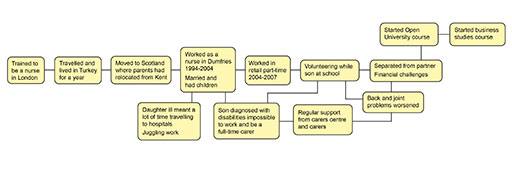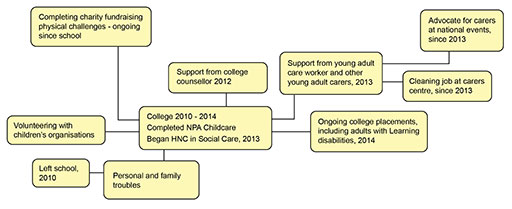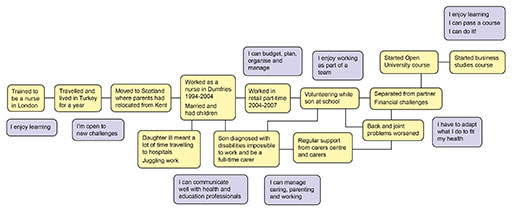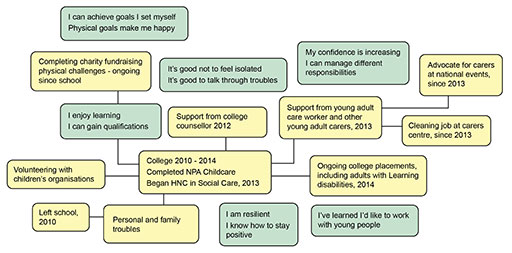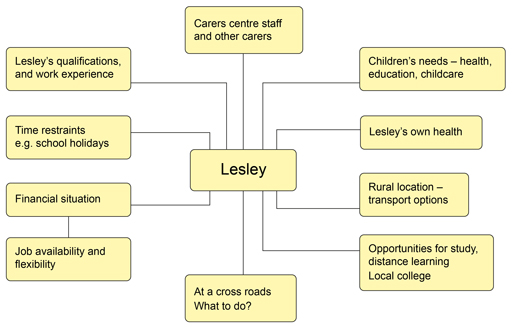Use 'Print preview' to check the number of pages and printer settings.
Print functionality varies between browsers.
Printable page generated Thursday, 27 November 2025, 11:51 AM
Session 2: Learning by looking at my life over time
Introduction
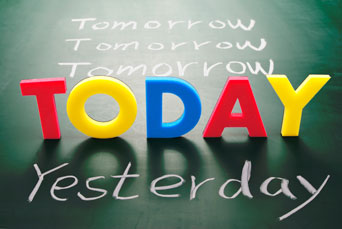
What can we learn by looking at our life, our experiences, over time? How can this be helpful for the future?
Session 1 drew on the experience of carers as they reflected on their present situation. People learn from good and bad experiences and the ups and downs of life. We saw how the experience of caring can have a strong influence regardless of how old you are, or how long you’ve been a carer.
A caring role may be something that developed over time and, as we saw with Jade and Dean, people don’t necessarily realise they fit into this category: it’s just something that’s ‘normal’ to them. For others, becoming a carer might have been a sudden event. Whatever the situation, circumstances can change quickly and sometimes things happen that are out of our control.
The value of looking at our roles and experiences, and recognising the influences on our lives, is that we can identify what really interests and motivates us and start to understand our decision making and how we react to events. Is there a pattern? What we consider important can change over time: our priorities can differ at different points in our life. How we feel about these experiences can vary too.
So, how do we define high points and low points? Are there recurring themes in the choices we make? Can we see the difference between choices that we make and changes that happen that are out of our control?
In this session carers look at their life experiences, focusing particularly on their caring experiences. The aim is to work out what skills and attributes they have built up, together with the qualities they have developed, particularly from caring, in addition to the obvious ones gained from education or work experience.
Learning outcomes
After working through this session you will have:
a clearer understanding of the experiences of carers
an appreciation of the various skills, qualities and attributes that carers may develop and how some of these are transferable to work contexts
an understanding of carers’ motivations to return to work, or to balance paid employment with their caring role.
Taking stock of my experiences over time
A timeline creates a graphic picture of your life (or a period in your life) that can help you to identify the ups and downs that have occurred. The timeline may also show any patterns or recurring themes that you may have been unaware of. It can help to define high points and low points and allow you to reflect on what you’ve learned from them.
In this session carers look at their life experiences, focusing particularly on their caring experiences. You can reflect on the skills and qualities they have developed through their caring role.
You may also find it interesting to try this activity for yourself. It can be difficult to look back over our life or our experiences. If you would prefer not to reflect on certain experiences, you can select which areas of your life you want to focus on.
To give you an idea of how a series of events in your life can be captured in a timeline take a look at the examples below.
Lesley
Lesley’s timeline begins when she starts her career as a nurse. The first few bubbles (moving from left to right) illustrate positive experiences occurring over time as she gains experience and progresses in her career.
Then Lesley’s life becomes more complicated. She is married and has children, but is also reacting to some new and difficult challenges. These are shown below the centre line.
The last part of Lesly’s timeline shows how difficult experiences are happening almost at the same time as positive events. Lesley is still a carer, with her own health problems and financial challenges, but she also has some ‘ups’. She has been able to make her own choices and enjoy new challenges, including completing an Open University course and starting a business studies course.
Timelines don’t always progress in ups and downs. Sometimes ups and downs can be happening at the same time, as this timeline shows.
Scott
Scott left school and started college, and we can see from his timeline that college is an ‘up’ compared to school, so college is positioned slightly higher. While at school and then starting out at college he had some difficult personal and family times. This box is lower, indicating a ‘down’.
Throughout these personal challenges Scott continued to make progress with his studies. He moved from having few qualifications to achieving a National Progression Award (NPA) in Childcare to working on a Higher National Certificate (HNC) in Social Care.
The volunteering and fundraising boxes are ‘ups’ that he often chooses to do.
The support Scott gained from a college counsellor, the young adult carers’ support worker and other carers have been high points in his life. These points in his timeline have led to further positive experiences, as the boxes show by moving up and to the right.
Activity 2.1
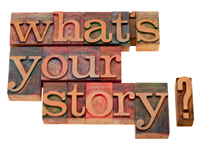
You might like to try creating your own timeline. However, for some people it can be very difficult to look back over their life or experiences; it may bring to mind some issues or memories that they would rather not confront. If this is the case, the timeline activity can be omitted. Alternatively, you may find it useful to discuss the events in your life with a person you trust.
But do bear in mind, your timeline doesn’t need to cover your whole life. You can choose to focus on just a few key events.
Activity 2.1 My timeline
Having looked at the examples try drawing your own timeline.
The actual timeframe will be up to you – it can include your whole life since childhood, or you might want to focus on your career, family life or, if you also have a caring role, your experience of life as a carer.
Go to Activity 2.1 in your Reflection Log. Once you have completed your activity, make sure you save the document again. Or you can use this document to plot your timeline, but don’t forget to save it.
You could use the drawing tools available in most word processing programs, such as Microsoft Word, to produce your timeline or other diagrams.
If you’d like to look at further IT options, you can use a free online software program to create images like the ones included in this course. Go to bubbl.us and click on Welcome, then on the main page select ‘Learn how to use bubbl.us’, and this will show you how to get started. (This is not an Open University website and the OU is not responsible for third party websites such as this or the information you choose to share with them.)
If you prefer not to use bubbl.us, or any other online tools, don’t worry – pen and paper will do just as well! You can print off the document above.
You may have other ways of representing your timeline. What is important in this activity is the information or understanding from your experience that is brought to mind. So, if you prefer, you can simply make a list of the high points and low points of the period of your life and reflect on these.
Remember, it’s up to you what you want to include and the timeframe you want to focus on – your whole life, or a specific period. Try to put low points lower down the page and high points above them, just as Lesley and Scott have done, but if your life has fewer ups and downs then just list them side by side. You do not need to include anything that you want to keep private.
If you are working in a group, or with a mentor, you might want to share and discuss your timeline.
Keep your timeline safe, you’ll need to refer to it for Activity 2.3.
Learning from caring experiences
From plotting what happened when, the next step is thinking about what you’ve learned from these different roles and experiences, and how you’ve developed as a person over time.
Look at Lesley’s timeline again but with some key learning points added.
The purple boxes summarise what Lesley has learned at different points in her life. The early part of her timeline shows that she enjoyed learning and was good with new challenges.
The middle, challenging, section of her timeline has produced a lot of different learning points relating to her caring role and her experience as a parent.
In the final section we can see that Lesley still enjoys learning. She has gained confidence from appreciating that she can succeed with a course.
Listen to Lesley talking about what she has learned.
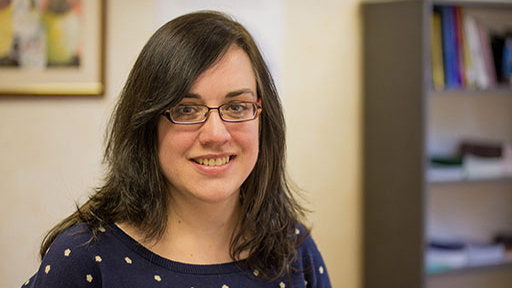
Transcript
Activity 2.2
You have heard Lesley talking about what she has learned from the different roles, environments and situations she has been in.
Here are some key words from Lesley’s comments:
- learned that she is resilient
- manage her time
- budget her finances
- manage stress
- capable of learning new things
- cope with difficult situations
- communicate well.
Activity 2.2 Learning from the caring experience
Think about the following questions and make some notes in your notebook or Reflection Log.
- Was some of Lesley’s learning unexpected?
- Did she learn from difficult times as well as good ones?
- Did Lesley learn things while caring that will be useful in studying and employment?
Go to Activity 2.2 in your Reflection Log. Once you have completed the activity make sure you save the document again. Alternatively, you can use this document but don’t forget to save it.
Learning points
Now look again at Scott’s timeline, which also has learning points added.
Scott’s learning points are linked to different areas of life, as well as over time. Very early on he realised he enjoys learning and that gaining qualifications brings confidence.
He made it through some tough personal experiences and family troubles, and feels proud to have got through these difficult times. This made Scott feel resilient and he has learned how to look on the positive side of life.
Gaining support from the young adult carers group was a very positive experience. Scott learned that it was not good for him to stay isolated, and that being part of a supportive group has helped him develop his confidence. He has learned that his well-being is also supported by setting and achieving the physical goals of fundraising activities. These three boxes are part of Scott’s ‘ups’.
Listen to what Scott says about what he has learned from experience.

Transcript
Through reflecting on his experiences Scott realised that he applied his skills and personal qualities to manage his caring and studying responsibilities.
Here are some key comments from Scott’s story:
- had very poor mental well-being for a while
- managed to keep going with his studying and caring
- benefited from the support from other young adult carers
- tries to focus on the positive as much as possible.
Scott now:
- has grown in confidence
- recognises his own resilience and coping skills
- has an understanding of what he’d like to achieve and how to get there.
We all experience ups and downs in life: good points and bad points. There may be positive and negative outcomes from each experience as Lesley and Scott’s experiences show.
Whatever our experience, we are learning all the time. Learning is not something that stops when we leave childhood behind. Learning is lifelong. Some learning is about ourselves – the type of person we are and our strengths and qualities. Other learning is about skills, qualifications, understanding ideas and concepts, or the society we live in.
If you created your own timeline you might want to try out the follow-on activity.
Activity 2.3
In the previous activity, carers looked at their life experiences, focusing particularly on their caring roles. You may also find it interesting to try this activity for yourself.
Activity 2.3 Learning from my experience
Look at your timeline again and think about what you have learned from your experiences. Looking over the ups and downs:
- Does the timeline help you to recall how you felt at each point?
- What did you learn from each situation?
Perhaps you found out more about your individual qualities and your ability to just keep going: qualities such as resilience, adaptability or reliability?
If you’re using bubbl.us you can add your learning points to your timeline in a different colour. You can find out how to do this in the bubbl.us help section. Once done, you can save your new image as a .JPG file and insert it into your Reflection Log.
If you’re using pen and paper or a word processing program, go to your Reflection Log and add your learning points to the timeline that you created in Activity 2.1. Make sure you save the document again. You can also complete the timeline using this document, but don’t forget to save it.
If you’re working with a group, you can share and discuss your learning points with others if you’d like to.
Looking backwards, looking forwards
You have been sharing in the experiences of carers as they look back at their life experiences, or at a particular period in their life. Lesley’s timeline showed that there are ups and downs, and that a number of factors have influenced her life. While she has control over some things, such as choosing nursing, or choosing to live in Scotland, other factors, like her son’s disabilities or her own back problems, are outside her control.
Having looked back on the carers’ journeys, in the next session you will be looking forwards and exploring factors that influence the choices the carers made about their future.
Later in the course you’ll think about carers’ support networks and what might help or hinder them in achieving their goals. Understanding the things that can be changed, and the things that have to be worked around, will help people to plan their next steps and find support for achieving them. This is something to bear in mind in your role as a manager.
To start you thinking about the factors that influence carers’ lives, have a look at Figure 2.7, which features Lesley’s experience.
Summary
In Session 1 you started to look at carers’ roles, skills and qualities. You were also invited to think about your own. The key point here was that by reflecting on our experiences, we learn something from them that helps us to move on.
Session 2 has shown how drawing a timeline is useful for plotting what happened and when, so that we can reflect on how we feel about these experiences, what we have learned from them, and how they have helped to shape us as a person.
Have the activities been useful? Did you learn anything new from the examples provided by carers, or by creating your own timeline?
If you would like to spend more time thinking about timelines, view The Open University’s example of how to create a timeline on the OU Careers pages.
You have now completed Session 2 but will explore these ideas further in Session 3.
Quiz
To conclude this part of the course and consolidate your learning you may like to complete the second quiz.
Quiz 2 provides evidence that you are achieving the following learning outcomes:
- a clearer understanding of the experiences of carers
- an appreciation of the various skills, qualities and attributes that carers may develop and how some of these are transferable to work contexts
- an understanding of carers’ motivations to return to work, or to balance paid employment with their caring role.
If you need a reminder about the quizzes and the criteria for getting a badge, visit How to complete the course quizzes.
Session 3: Identifying carers’ skills, qualities and attributes
Acknowledgements
Caring Counts: a reflection and planning course for carers was written by Lindsay Hewitt and Sarah Burton, quizzes by Julie Robson, The Open University.
This course was redeveloped to create Caring_Counts_in_the_Workplace in collaboration with Gill Ryan from NHS Education for Scotland and the Scottish Social Services Council’s Equal Partners in Care project, together with Sue McLintock (Carers Scotland) from the Scottish Government’s Carer Positive initiative.
Except for third party materials and otherwise stated (see terms and conditions), this content is made available under a Creative Commons Attribution-NonCommercial-ShareAlike 4.0 Licence.
The material acknowledged below is Proprietary and used under licence (not subject to Creative Commons Licence). Grateful acknowledgement is made to the following sources for permission to reproduce material in this unit:
Images
Figure 2.1: © Revensis/Dreamstime.com
Figure 2.4: Marek Uliasz/Dreamstime.com
Video
Video: © The Open University
Every effort has been made to contact copyright owners. If any have been inadvertently overlooked, the publishers will be pleased to make the necessary arrangements at the first opportunity.
Don’t miss out:
1. Join over 200,000 students, currently studying with The Open University – http://www.open.ac.uk/ choose/ ou/ open-content
2. Enjoyed this? Find out more about this topic or browse all our free course materials on OpenLearn – http://www.open.edu/ openlearn/
3. Outside the UK? We have students in over a hundred countries studying online qualifications – http://www.openuniversity.edu/ – including an MBA at our triple accredited Business School.
4. Carer Positive – Find out more about the award for employers http://www.carerpositive.org/
5. Equal Partners in Care – Find out more about the Scottish framework for learning and practice with carers and young carers www.knowledge.scot.nhs.uk/ equalpartnersincare or www.ssks.org.uk/ equalpartnersincare
